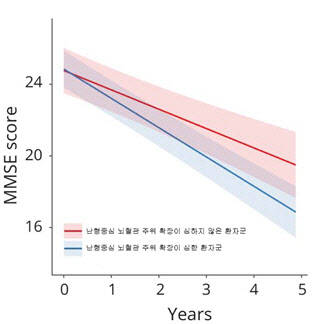[이데일리 이순용 기자] Jeong Seung-ho, professor of neurology at Sanggye Paik Hospital of Inje University, Jeong Seok-jong, professor of neurology at Yongin Severance College Hospital of Yonsei University, and Lee Pil-hyu, professor of neurology at Severance Hospital, and their team found that cognitive function deteriorates rapidly in Alzheimer’s disease when the degree of cerebral vascular space expansion is severe
“Dilatation of the perivascular space” is a common finding when MRI of the brain is done, and the finding of this finding means that there is a problem with the function of cleaning waste and toxins in the brain.
The research team performed 3T (Tesla: Tesla, magnetic field strength) MRI brain images of 208 Alzheimer’s disease patients with amyloid deposits confirmed by amyloid PET imaging at Severance Hospital during the diagnosis of Alzheimer’s disease. centrum semiovale) and hippocampus were analyzed to confirm the degree of expansion of the cerebral vascular space.
Furthermore, in 158 Alzheimer’s disease patients who underwent the Mini-Mental State Exam two or more times at intervals of at least 1 year, the relationship between cerebral vascular space expansion and the rate of decline in cognition score was analyzed. .
As a result of the study, although no correlation was found between cerebral vascular space expansion and the degree of amyloid deposition in the three regions, the cognition score of patients with severe cerebral vascular space expansion in the ovoid center decreased rapidly by 0.58 points each year compared to those without it
|
Although it is known to some extent that cerebrovascular space expansion is associated with Alzheimer’s disease and dementia through previous studies, this study is the first to show that cerebrovascular space expansion is associated with cognitive decline in patients with the disease confirmed Alzheimer’s. had been found to be This suggests that therapies targeting the expansion of the perivascular space in the brain may help inhibit the progression of Alzheimer’s disease.
Professor Jeong Seung-ho (Department of Neurology, Sanggye Paik Hospital) said: ‘The association between cerebral vascular space expansion and Alzheimer’s disease and dementia was known to some extent in previous studies, but this study conducted a longitudinal analysis in patients with confirmed Alzheimer’s disease and analyzed the cerebral vascular space.”It is significant in that it is the first to reveal that expansion is associated with cognitive decline.”
Professor Jeong Seok-jong (Department of Neurology, Yongin Severance Hospital) said: ‘The expansion of the space around brain blood vessels is an imaging finding that can easily be confirmed by taking an MRI of the brain. “We expect it will be relatively simple to predict cognition-related prognosis when treating patients with Alzheimer’s disease.”
Professor Pil-Hyu Lee (Department of Neurology, Severance Hospital) said: ‘The expansion of the space around the brain blood vessels means that there is a problem with the function of cleaning waste and toxins in the brain. “This suggests that therapies targeting this may help inhibit the progression of Alzheimer’s disease.”
This study was recently published in “Neurology”, a leading SCI-level journal in the field of clinical neurology.


